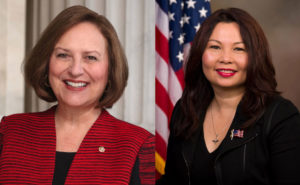 U.S. Senators Tammy Duckworth (D-IL) and Deb Fischer (R-NE), along with Joni Ernst (R-IA), Amy Klobuchar (D-MN) and Chuck Grassley (R-IA), are introducing bipartisan legislation to identify the standards required to meet the definition of sustainable aviation fuel (SAF) at the Federal Aviation Administration (FAA).
U.S. Senators Tammy Duckworth (D-IL) and Deb Fischer (R-NE), along with Joni Ernst (R-IA), Amy Klobuchar (D-MN) and Chuck Grassley (R-IA), are introducing bipartisan legislation to identify the standards required to meet the definition of sustainable aviation fuel (SAF) at the Federal Aviation Administration (FAA).
The Sustainable Aviation Fuels Accuracy Act of 2023 would require the federal government to use the most up-to-date lifecycle emissions models, such as the GREET model, “that accurately considers crops, land uses and carbon reduction practices in the U.S and does not arbitrarily prevent our American farmers and crops from contributing to our green economy.”
Sen. Duckworth, who is a pilot and member of the Senate Transportation Committee, said, “One of the most important things we can do to make American aviation more sustainable is increase the supply of American-grown, American-made, sustainable aviation fuel.”
“Emissions modeling needs to reflect the latest science and technology. The GREET Model will more accurately capture the environmental benefits of biofuels, including for sustainable aviation fuels,” said Sen. Fischer.
Biofuels organizations and stakeholder groups are in full support of the bill. American Coalition for Ethanol (ACE) CEO Brian Jennings says the GREET model is the global gold standard for lifecycle analysis. “This bill is consistent with what Congress requires Treasury to follow with respect to implementing the new 45Z tax credit, and since the SAF tax credit eventually migrates to 45Z this makes good policy sense,” said Jennings.
“Producers need the ability to rely on a U.S. model that is consistently updated with accurate, real-world data from the industry,” said Kurt Kovarik, Vice President of Federal Affairs, Clean Fuels Alliance America. “The Department of Energy’s GREET model should be the gold standard.”

